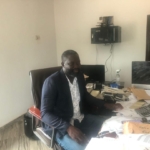
The Chief Executive Officer of Mobik Energy, Joseph Cobbinah, popularly known as Kabie, has sounded a strong alarm over the environmental crisis unfolding in the Tarkwa Nsuaem Municipality of the Western region, particularly the rapid disappearance of rivers and streams that once sustained local communities.
Speaking with deep concern about the deteriorating state of Tarkwa’s water bodies, Cobbinah painted a vivid picture of his childhood memories compared to today’s harsh reality.
“Growing up, we used to swim and play in these rivers in Tarkwa,” he recalled. “When there was water scarcity, we could depend on these rivers for water. Now, they are disappearing.”
Cobbinah cited specific examples to illustrate the extent of the damage: “There was a stream around UMaT (University of Mines and Technology) where we used to play. These days, when one passes there, the stream is no more. One river, Kawir, which was wide, is gradually turning into a stream.”
Once essential for household activities like cooking and washing—especially during weekend water shortages—many of these rivers are now barely visible, threatening the basic livelihoods of residents.
Human Encroachment and Climate Change: A Dangerous Mix
Cobbinah attributes the problem to a combination of human activities and climate change. He lamented the reckless encroachment on water bodies that has compounded natural climatic shifts.
“One can’t really tell why it is so, but I think it’s nature, and once humans are encroaching more, we are losing them. Climate change has really affected Tarkwa,” he explained.
He also condemned the direct interference with river ecosystems, noting:
“These days, people are not scared to work in river bodies, causing the rivers not to flow in their natural state.”
Cobbinah highlighted the wider environmental consequences of this loss: “Rivers and streams are very essential in our lives because when the weather is extremely hot, it’s the rivers and streams that absorb the heat. When these rivers and streams are extinct, most people can’t stand the heat.”
A Call for Immediate Action
The Mobik Energy CEO called on authorities to act swiftly to prevent further degradation of Tarkwa’s fragile ecosystem.
“I hope the authorities will work on those who are encroaching and building near rivers and streams,” he said, warning that failure to act could lead to long-term environmental damage with severe social and economic consequences.
Cobbinah’s message is a stark reminder that environmental preservation is not just a government responsibility but a community obligation. Protecting Tarkwa’s rivers and streams, he insists, is key to sustaining life and ensuring the well-being of future generations.
The youth and betting
Mr Joseph Cobbinah also expressed deep concern over the growing obsession of Tarkwa Nsuaem’s youth with sports betting, warning that the trend is setting them up for long-term failure.
In a passionate appeal, Cobbinah described betting addiction as a dangerous social crisis that is fast replacing hard work and entrepreneurship among young people.
“The youth these days don’t like to work and want an easy way out in life,” he said. “Betting has become their life and work, which will not end well for them. It has now become the norm in the country. Some hardly go out and stay indoors just to check on betting on their phones.”
Cobbinah stressed that while betting may offer short-term gains, it cannot secure a sustainable future.
“Betting can sustain you in terms of feeding and other minor things, but it can’t sustain you in the future. Life is not about sitting in one place and playing Draft or betting on your phone. There is no magic that says you can do betting and be a better person in life,” he warned.
Read Also: Hard work, not betting, will secure your future -Mobik Energy CEO advises Tarkwa Youth
